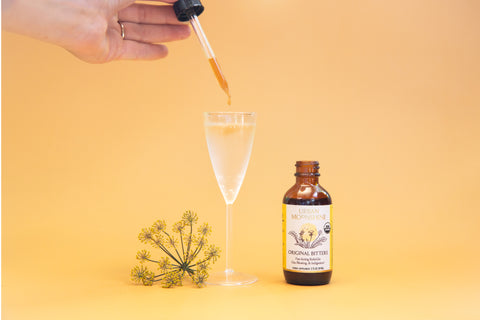Herbal Medicine? Digestive Bitters? These terms often raise more questions than answers. Here are the top things you need to know about digestive bitters if you’re bitter curious or just need a little reminder of why you were so excited to buy that bottle of bitters a few months ago; it’s time to dust off that bottle and put the bitter flavor front and center. The root of good health is great digestion, and bitters are here to ignite your digestive power and oh so much more.*
1. Do digestive bitters really work?
That question happens to be one of the top googled questions about bitters. We’re here to tell you that yes they do! Bitters help to stimulate digestive juices, ease occasional digestive upset, and have been traditionally used for centuries around mealtimes for optimized digestion.* We are hardwired for the flavor of bitterness, which is the primary taste of most wild foods. For thousands of years, most of our food was some spectrum of bitter leaves, bitter roots, and wild berries and fruits along with whatever protein could be hunted. We might not remember but our bodies and our brains do. Our modern American diets are mostly devoid of the bitter flavor unless it is coffee, beer or chocolate.
2. Are they actually bitter?
Yes, that’s the point! Tasting the bitter flavor right on the tongue (cue the full-body tingle) is the important part. The bitterness triggers our digestive juices, it ‘turns us on’ and activates a digestive response. It’s actually the challenge of the bitter flavor that strengthens our digestion. Taste only sweet, salty, and heavily processed foods day in day out and it will have an impact on our health and vitality. Whether enjoying a fresh dandelion green from your front yard, your favorite bitter cocktail (Negroni please!), or Urban Moonshine digestive bitters on your tongue–the flavor will help keep your system running smoothly.*
3. So, what are bitters good for?
Most people reach for digestive bitters because they are looking for a solution to annoying or unpleasant digestive issues, most commonly gas, bloating and occasional heartburn. Our original and citrus bitters are our best sellers for those after meal inconveniences. But many other folks reach for bitters to help regulate appetite. Bitters can also help encourage your body’s own endogenous production of and important juices that are crucial to complete the digestive process. Taking bitters regularly along with a nutrient dense, whole food diet also support beautiful skin and When our bodies are properly processing food and completing our natural digestive cycle it helps us keep our system naturally detoxed, our livers happy and our skin healthy.
4. Taking bitters–the when, where and how
We recommend taking Urban Moonshine herbal bitters 10-15 minutes before meals to help prime digestion. This will decrease digestive drama and all the lovely side effects of overindulging. You can also take them after meals if you’re feeling full, bloated and gassy. When the bitter flavor hits the tongue it’s like a door-bell message to your stomach to get ready for a meal! In the end, we always say that the best time to take your bitters is when you remember to do so. Don’t worry too much about the when, the important thing is to bring the flavor back into your diet and however you do that is just fine. “Oh look, my bitters are just sitting there on the counter/in my purse/in the cupboard–I should take some.” Winning.*
5. The environmental case for bitters
Yes, you read that right. Consider yourself an environmentalist for buying or making your own digestive bitters! As we discussed earlier, the flavor of bitter is an antidote to our over-processed sugary diets. Our world needs less big-ag monocropping corn for sugary foods and more small farms growing a diversity of veggies, greens and the botanicals from which bitters are made. Taste bitter, feel better and embrace the taste of the wild to keep this planet rich with biodiversity.

